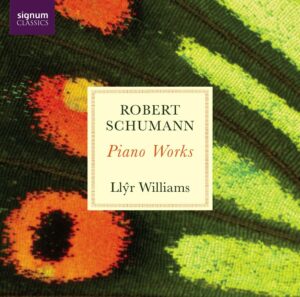Having recorded complete Beethoven and Schubert sonata cycles for Signum, Llŷr Williams now focuses his attention on Schumann, serving up no less than six major works on two discs. By and large he is a smooth and steady player who favors care and polish over volatility and impulsiveness.
In the C major Fantasie, Williams plays down the first movement’s sudden mood swings that are so sharply characterized in Fabrizio Chiovetta’s recent recording, patiently unraveling the full-bodied textural terrain instead. Williams gives specific shape to the busy left-hand figurations and leans into the dissonances, albeit without Sergio Fiorentino’s dramatic intensity and dynamic scope. Williams cleanly dispatches the central movement’s dotted rhythms, yet misses the driving momentum and nervous energy we hear from pianists so antipodal as Pollini, Arrau, and Kissin. Papillons’ waltzing episodes make up in lightness what they lack in soaring lilt.
In the Humoreske, Williams takes care to articulate Schumann’s phrase groupings and highlights bass lines by striking certain notes ever-so-slightly behind the beat. I find Williams more vertical than horizontal in his approach to voicing Schumann’s contrapuntal elaboration, except for in the work’s final six minutes. As such, I prefer more linearly oriented readings, primarily those of Horowitz, Arrau, Ax, Goode, and Richter, plus Ashkenazy in the first and better of his two Decca recordings. In this company I also should mention lesser known yet worthy Humoreskes from Matthieu Cognet (Odradek) and a remarkable live performance by a gifted pianist who died young, Andrew De Grado (Centaur).
Williams’ Davidsbundlertänze has marvelous moments. His deliberation in the first piece and skittish “stride piano” left hand in No. 8 grab your attention, as does his beautifully spun out legato in Nos. 2, 5, and 11. However, some of the more musically and technically challenging movements come off more interestingly in other recent interpretations.
Tiffany Poon (Pentatone), for example, brings more abandon to No. 4’s broken chords while liberating No. 6’s rapid left-hand triplets from their usual cookie cutter uniformity. For overall ardency and fearlessness under studio conditions, José Navarro-Silberstein (Naïve) and Marcin Fleszar (Rubicon) remain my current Davidsbundlertänze choices. The Nachtstücke Op. 23 ranges from exquisitely sculpted (No. 4) to oddly dry and detached (No. 3).
The long first movement of Faschingsschwank aus Wien gathers steam as it progresses, in contrast to Williams’ straightforward and matter-of-fact second-movement Romanze and flat-footed Scherzino. I’ve heard more impassioned renditions of the Intermezzo, while Williams’ Finale sounds studio bound next to the fiery control that Anderszewski and Michelangeli display in front of an audience.
In sum, Llŷr Williams’ solid and respectable Schumann has much to offer and mostly won’t steer you wrong. However, the formidable and superior catalog competition speaks for itself.
































